Recovering from limb loss or injury is not just about physical rehabilitation—it is also a mental journey. The body and mind are deeply connected, and the way you think affects the way you heal. While rehabilitation focuses on rebuilding strength and mobility, it also plays a crucial role in boosting confidence, resilience, and emotional well-being.
Many people assume that physical recovery is only about training the body to function again. However, every small step in rehabilitation is also a step toward mental strength. The more you push your body to adapt, the more you train your mind to overcome obstacles. Learning to walk again, mastering the use of a prosthetic, or even regaining control over simple movements all require mental determination.
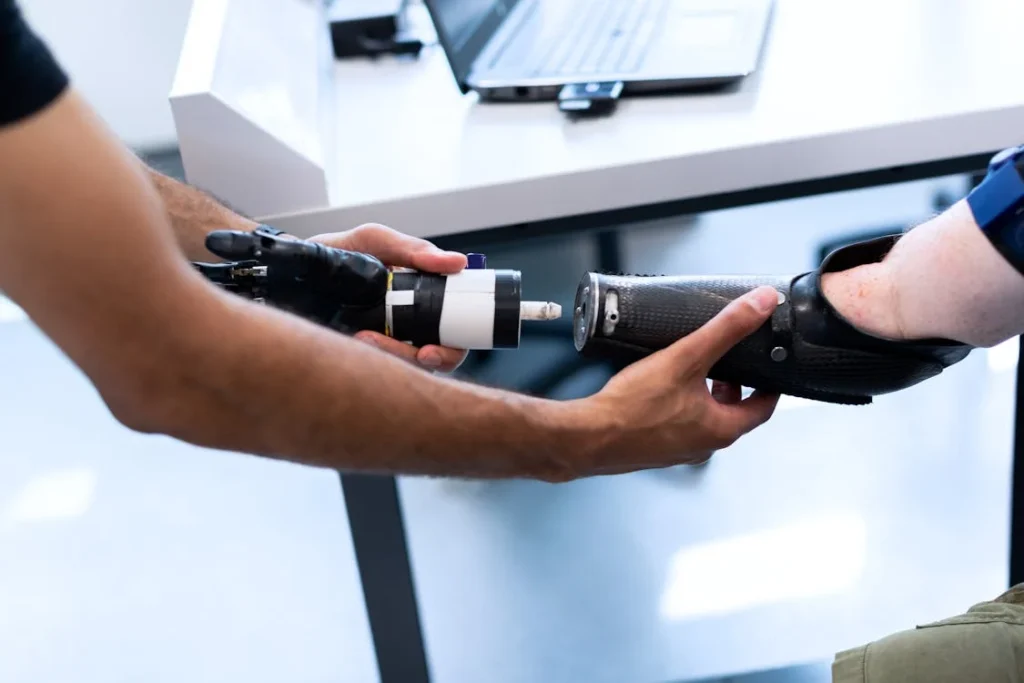
How Physical Rehabilitation Builds Mental Strength
Recovering from an injury or adapting to a prosthetic is not just about rebuilding physical ability—it is about training your mind to face challenges with resilience.
Every step you take in physical rehabilitation strengthens your mental endurance, shaping the way you approach setbacks, pain, and progress. The mind and body work together, and when one becomes stronger, the other follows.
Overcoming Initial Fear and Uncertainty
Starting rehabilitation can feel overwhelming. The body may feel unfamiliar, and simple movements that were once effortless may now require conscious effort.
This can lead to frustration, fear, and even self-doubt. The thought of learning to walk again, using a prosthetic, or regaining lost strength may seem impossible at first. But rehabilitation teaches an important lesson: progress happens one step at a time.
Every session, every small improvement, and every challenge overcome helps rewire the brain to focus on what is possible instead of what is lost. As the body adapts, the mind learns that setbacks are temporary and that patience leads to progress.
The key is to take things at your own pace, reminding yourself that every effort, no matter how small, moves you forward.
Developing Patience and Resilience
Physical rehabilitation is not a quick process. It requires consistency, effort, and mental discipline. Some days will feel easier than others, but setbacks are a natural part of the journey. One of the biggest mental challenges is learning to accept slow progress without losing motivation.
Patience is essential. The body needs time to heal and adjust, and expecting immediate results can lead to frustration. Each small milestone—whether it is standing for longer periods, improving balance, or mastering a new movement—adds up over time.
The ability to stay committed despite slow progress builds resilience, a mental strength that extends beyond rehabilitation and into all aspects of life.
Gaining Confidence Through Movement
Confidence comes from experience. When you start physical rehabilitation, movements may feel unnatural or difficult. But with repetition, the body learns, and the mind follows.
The more you practice, the more natural movements become, and the more confidence you gain in your abilities.
For those using a prosthetic, learning to trust the device is as much a mental process as a physical one. At first, it may feel foreign or difficult to control, but with consistent use, it becomes an extension of the body.
The transition from uncertainty to comfort is not just about mechanics—it is about believing in your own capability to adapt.
Shifting Focus from Limitations to Possibilities
A strong mind does not dwell on what is missing—it focuses on what can be achieved. Physical rehabilitation shifts the focus from what was lost to what can be regained. Instead of thinking, “I can’t do this anymore,” the mindset becomes, “How can I learn to do this differently?”
This shift in thinking is one of the most powerful aspects of rehabilitation. It trains the brain to look for solutions instead of obstacles.
This problem-solving mindset extends beyond physical therapy sessions and into everyday life, making challenges feel more manageable and fostering a sense of independence.
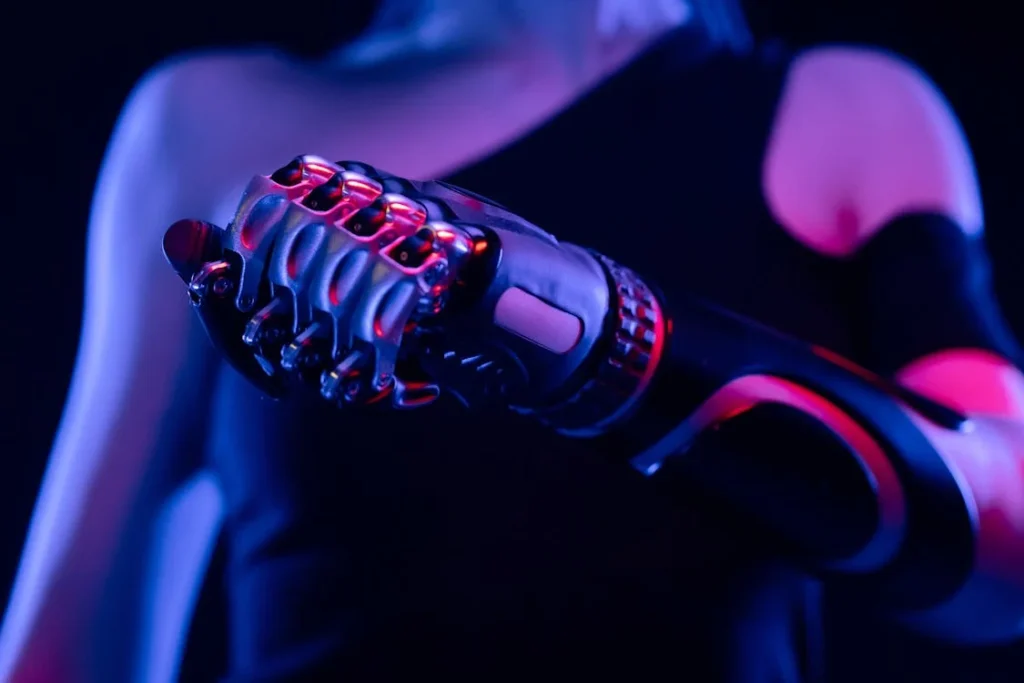
The Role of Mindset in Physical Recovery
The way you think about your rehabilitation plays a major role in how successful it will be. A positive and determined mindset can push you forward, while doubt and frustration can slow progress.
The mind has a powerful influence over the body, and when you train yourself to think differently about recovery, the journey becomes easier and more effective.
Believing in Your Ability to Improve
One of the most important aspects of physical rehabilitation is believing that progress is possible. When someone feels discouraged, they may think, “I’ll never get better,” or “This is too hard for me.”
These thoughts can make it difficult to stay motivated. However, shifting your mindset to focus on improvement—rather than immediate results—can change everything.
Rehabilitation is a process, and every step forward is proof that improvement is happening. Even on difficult days, reminding yourself of past progress can provide motivation.
Instead of focusing on what is not yet possible, celebrating small wins builds confidence and reinforces the belief that you can and will get stronger.
Managing Frustration and Setbacks
Setbacks are a natural part of rehabilitation. There will be days when progress feels slow or when a task that seemed easy yesterday feels harder today. This can be frustrating, but how you respond to setbacks determines whether they hold you back or push you forward.
A strong mindset accepts setbacks as part of the journey. Instead of seeing them as failures, they can be seen as learning opportunities.
When something does not go as planned, asking, “What can I do differently?” instead of “Why can’t I do this?” keeps the focus on solutions rather than frustration.
Staying Motivated Through Routine and Habit
Motivation does not always come naturally. There will be days when getting up and attending rehabilitation feels exhausting, both physically and mentally.
This is why building a routine is so important. When rehabilitation becomes part of a daily habit, it is easier to stay consistent, even on difficult days.
Small daily actions—stretching, practicing movements, or using a prosthetic—create long-term progress. The key is to show up every day, even when motivation is low. Over time, seeing the benefits of consistent effort reinforces the belief that persistence leads to results.
The Power of Visualization in Rehabilitation
Many athletes and performers use visualization techniques to improve their skills, and the same strategy can be useful in rehabilitation.
Imagining yourself walking steadily, using your prosthetic smoothly, or completing a physical task successfully can help train the brain to believe it is possible.
The brain responds to mental images in a similar way to real experiences. By picturing success before it happens, the mind prepares the body to achieve it. This technique, when combined with physical practice, can accelerate progress and boost confidence.
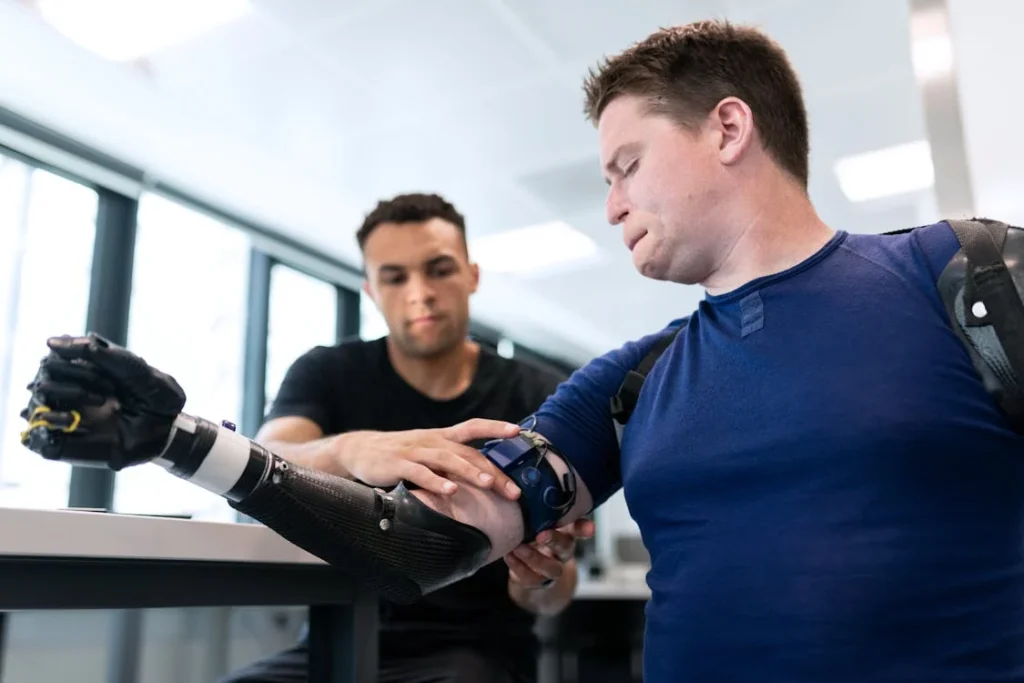
The Impact of Physical Activity on Mental Health
Physical rehabilitation does more than restore movement—it also improves mental health. When the body is active, the brain responds with chemical changes that boost mood, reduce stress, and increase motivation.
Many people who go through rehabilitation experience emotional ups and downs, but staying active can help create balance and stability in the mind.
Exercise and the Release of Positive Brain Chemicals
Movement triggers the release of brain chemicals called endorphins, which are natural mood boosters. Endorphins reduce stress, ease pain, and promote a sense of well-being.
This is why physical activity, even in small amounts, can improve overall mood and help reduce feelings of anxiety or sadness.
For individuals going through rehabilitation, these natural benefits can be especially important. Recovery can sometimes feel emotionally draining, but regular movement can help combat those feelings.
Even gentle exercises, such as stretching or using a prosthetic during daily activities, can have a positive impact on mental well-being.
Building Confidence Through Physical Strength
As the body becomes stronger, so does the mind. Rehabilitation helps individuals regain control over their movements, which builds a sense of confidence and self-trust.
The ability to complete a new movement, adjust to a prosthetic, or improve endurance reinforces the belief that progress is happening.
Each physical achievement serves as proof that the body is capable of adapting and growing. This sense of accomplishment carries over into daily life, making challenges feel more manageable and increasing self-esteem.
Reducing Stress and Improving Sleep
Recovering from an injury or learning to use a prosthetic can sometimes lead to stress and difficulty sleeping. The body may feel tense, and the mind may be filled with worries about progress, independence, or the future.
Physical activity helps manage this stress by reducing levels of cortisol, the hormone responsible for anxiety.
Movement also improves sleep patterns. Engaging in rehabilitation exercises during the day can make it easier to relax at night, leading to deeper and more restful sleep.
Better sleep, in turn, improves focus, energy levels, and emotional resilience, making it easier to stay motivated throughout the rehabilitation journey.
Encouraging a Positive Mindset Through Activity
Physical activity does not just benefit the body—it shifts the way people think about themselves. When someone is actively engaged in rehabilitation, they are proving to themselves that they are taking control of their recovery.
This sense of purpose and determination creates a positive feedback loop, reinforcing mental strength.
By viewing rehabilitation not as a burden but as an opportunity to grow, individuals can reshape the way they experience recovery. Instead of feeling restricted by limitations, they begin to see their own potential.
This shift in mindset is one of the most powerful aspects of rehabilitation, helping individuals move forward with confidence and optimism.
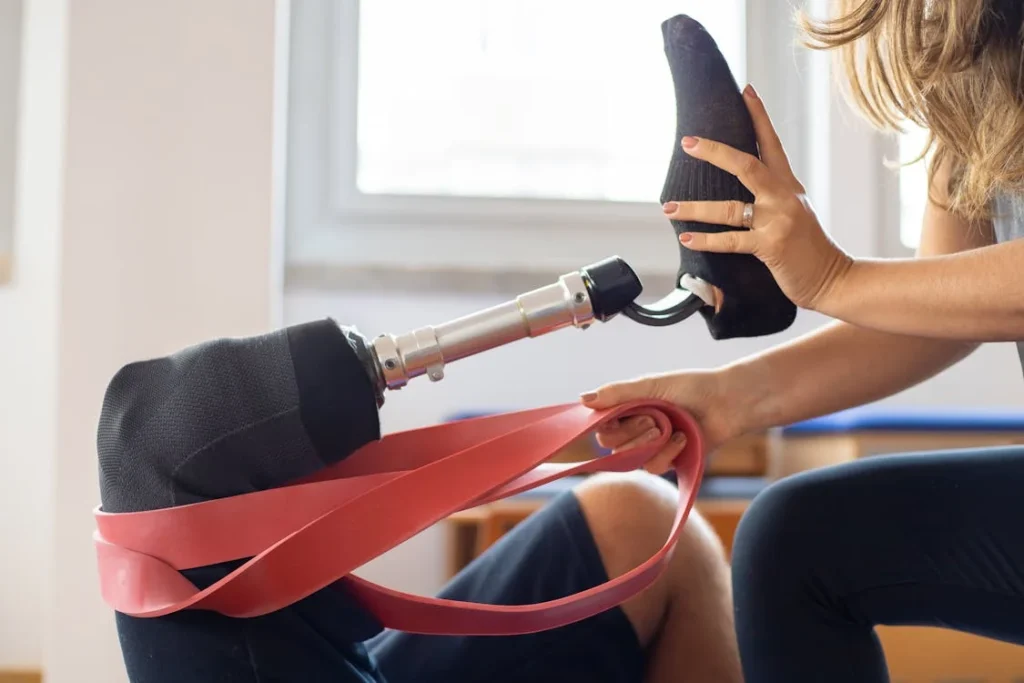
The Role of Support Systems in Rehabilitation and Mental Strength
Recovery is not something that happens in isolation. Having a strong support system—whether from family, friends, therapists, or support groups—can make a huge difference in both physical rehabilitation and mental well-being.
Encouragement from others helps maintain motivation, reduces feelings of loneliness, and provides emotional stability during the challenges of recovery.
Emotional Support from Family and Friends
When going through rehabilitation, emotional support from loved ones can be just as important as physical therapy.
Simple acts of encouragement—like celebrating small progress, offering a listening ear, or providing assistance when needed—can boost morale and reinforce self-belief. Knowing that others believe in your recovery makes it easier to stay committed to the process.
At the same time, it is important to communicate personal needs. Some days may feel overwhelming, and needing space to process emotions is natural.
Being open about feelings, whether it is frustration, exhaustion, or hope, allows family and friends to provide the right kind of support.
Guidance from Rehabilitation Specialists
Physical therapists, prosthetists, and rehabilitation professionals play a key role in both physical and mental recovery. They not only help improve movement and strength but also offer reassurance and guidance through the journey.
Having a knowledgeable and supportive rehabilitation team can help reduce fear, answer questions, and provide encouragement during difficult moments.
Regular check-ins with rehabilitation specialists allow individuals to track progress and adjust treatment plans when needed. When recovery feels slow, a therapist’s reassurance that progress is still being made can help prevent discouragement and maintain focus.
Connecting with Others Who Have Similar Experiences
Speaking with others who have gone through similar rehabilitation experiences can be incredibly empowering.
Whether through in-person support groups, online communities, or mentorship programs, connecting with people who understand the journey firsthand provides a sense of belonging and shared strength.
Hearing stories of others who have successfully adapted to prosthetics or regained mobility after an injury can be a source of inspiration. It serves as proof that recovery is possible and that challenges can be overcome.
Support groups also provide a safe space to share emotions, ask questions, and gain practical advice from those who have walked a similar path.
Encouraging Independence While Offering Support
While emotional support is essential, it is equally important to encourage independence. Recovery is about regaining confidence in one’s own abilities, and too much assistance can sometimes slow down that process.
Encouraging self-sufficiency—while still offering help when needed—allows individuals to take ownership of their rehabilitation journey.
A balanced support system provides both encouragement and space for personal growth. The combination of emotional reassurance, professional guidance, and peer connections creates a strong foundation for both physical and mental resilience.

How Goal Setting Strengthens Both the Body and Mind
Setting goals is a powerful tool in both physical rehabilitation and mental resilience. Goals provide direction, motivation, and a sense of achievement.
Whether it is regaining mobility, learning to use a prosthetic, or improving strength, having clear objectives helps make the recovery journey more structured and rewarding.
The Importance of Small, Achievable Goals
Rehabilitation can feel overwhelming if the focus is only on the final outcome. Instead of thinking, “I need to walk perfectly again,” or “I need to fully master my prosthetic right away,” breaking the process into smaller, realistic steps can make progress feel more manageable.
Small goals create a steady sense of achievement, reinforcing both physical and mental strength.
For example, instead of aiming to walk a long distance immediately, a better goal could be standing comfortably for a longer period.
Instead of mastering fine motor movements with a prosthetic hand all at once, the focus could be on grasping simple objects first. Each small victory builds confidence, proving that progress is happening—even if it is slow.
Tracking Progress to Stay Motivated
One of the best ways to stay motivated during rehabilitation is to track progress. Improvement is not always noticeable on a daily basis, but looking back at where things started can highlight how far one has come.
Keeping a journal, recording milestones, or taking note of new abilities can be a great way to stay encouraged.
Rehabilitation is a journey, and every effort counts. On difficult days, revisiting past successes can serve as a reminder that setbacks are temporary and that progress is still being made.
Using Goals to Build Mental Strength
The process of setting and achieving goals does not just strengthen the body—it also strengthens the mind.
The discipline required to stick to a rehabilitation plan, the patience needed to overcome setbacks, and the confidence gained through progress all contribute to mental resilience.
A strong mindset views goals not as limitations, but as stepping stones toward greater independence. Even when challenges arise, having a goal provides a reason to keep moving forward.
The ability to set, work toward, and achieve goals becomes a lifelong skill, useful far beyond the rehabilitation process.
Adapting Goals to Changing Needs
Recovery is not a straight path, and goals may need to change over time. Some milestones may take longer than expected, while new challenges may emerge along the way.
Being flexible and adjusting goals as needed ensures that rehabilitation remains productive rather than discouraging.
The key is to remain focused on progress, rather than perfection. Each step forward, no matter how small, is proof of growth and resilience.
With a structured approach to goal setting, individuals can stay motivated, build confidence, and develop a mindset that embraces challenges as opportunities for improvement.
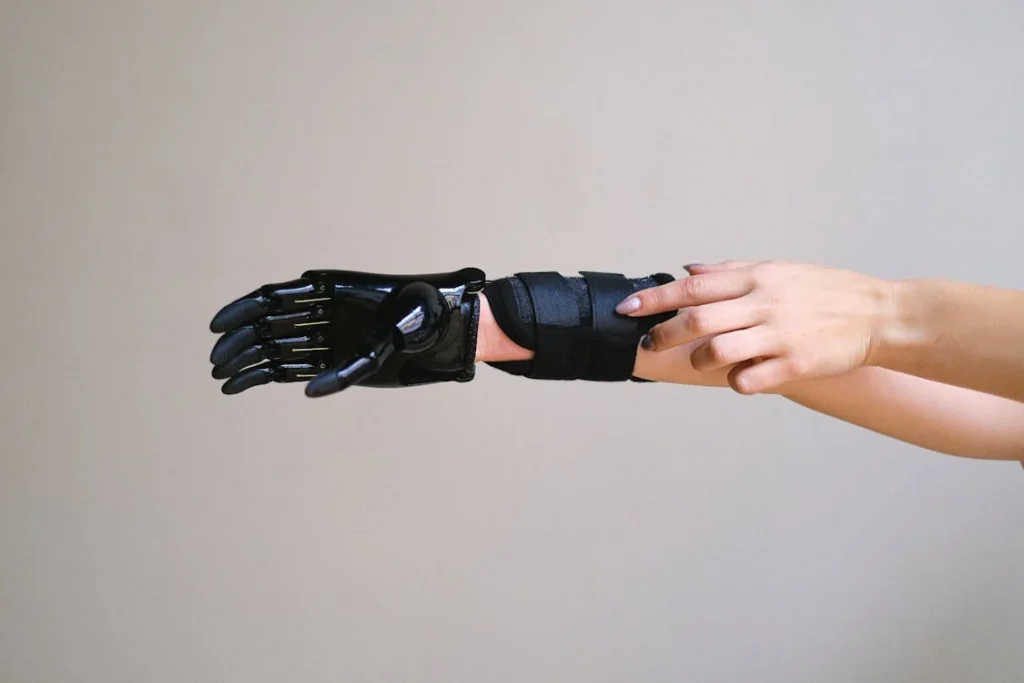
The Connection Between Rehabilitation and Emotional Healing
Physical rehabilitation is not just about regaining movement—it is also a form of emotional healing. After an injury or amputation, many individuals experience a wide range of emotions, from frustration and sadness to hope and determination.
Engaging in rehabilitation helps process these emotions in a constructive way, providing a sense of progress and control over one’s recovery.
Regaining a Sense of Control
One of the biggest emotional challenges after limb loss or injury is the feeling of losing control. The body may not respond the way it used to, and daily tasks might require more effort or adaptation.
This can lead to feelings of helplessness. Rehabilitation, however, gives individuals the power to reclaim their independence, one step at a time.
Each session, each repeated movement, and each moment of progress reminds the mind that improvement is possible. By actively working toward recovery, individuals shift from feeling like something happened to them to feeling like they are taking charge of their own future.
This shift in mindset is critical for emotional healing, reinforcing the idea that life can still be full, rewarding, and independent.
Processing Grief and Adjusting to Change
Losing a limb or experiencing a serious injury often comes with a period of grief. It is natural to mourn the loss of physical abilities or the way life used to be. Many people go through different emotional stages, from denial and anger to sadness and, eventually, acceptance.
Rehabilitation plays a crucial role in this adjustment process. It provides a structured way to move forward, allowing individuals to focus on what they can do rather than what has changed.
The simple act of getting stronger, gaining more control, or learning a new way to complete a task can bring a sense of accomplishment that replaces feelings of loss with confidence.
Using Movement to Release Emotional Stress
Emotions are stored in the body. When people feel stress, anxiety, or sadness, it often manifests physically—through muscle tension, fatigue, or even pain.
Engaging in physical rehabilitation helps release this built-up emotional stress. Movement promotes better circulation, relaxes the body, and reduces tension, leading to a more balanced emotional state.
For individuals struggling with anxiety or frustration, rehabilitation can serve as an outlet. The focus required to complete exercises, adjust to a prosthetic, or improve coordination shifts attention away from negative emotions.
Instead of dwelling on worries, the mind becomes engaged in something productive and meaningful.
The Healing Power of Routine
Rehabilitation creates a daily structure, which is essential for emotional stability. When life feels uncertain, having a routine provides a sense of normalcy.
Knowing that there is a plan in place, with steps toward improvement, can help individuals feel grounded and less overwhelmed by change.
Beyond physical recovery, rehabilitation can serve as a foundation for emotional healing. By committing to the process, individuals develop resilience, patience, and self-trust—mental strengths that will serve them well in every aspect of life.
Conclusion
Physical rehabilitation is about more than just restoring movement—it is about rebuilding confidence, resilience, and mental strength. The journey of recovery is as much a mental process as it is a physical one. Every exercise completed, every challenge overcome, and every small victory reinforces the belief that progress is possible.
The connection between the body and mind is undeniable. When you push your body to adapt, your mind learns perseverance. When you set goals and achieve them, you build confidence. When you face setbacks and keep going, you develop resilience. Through rehabilitation, you are not just regaining mobility—you are proving to yourself that you are capable of overcoming obstacles and moving forward with strength.
If you are looking for advanced prosthetic solutions that can help make rehabilitation smoother and more effective, Robobionics is here to help. Our cutting-edge prosthetics, including Grippy™, our advanced bionic hand, are designed to provide comfort, functionality, and ease of use. Book a free demo today and take the next step in your recovery journey with confidence.
Your body and mind are stronger than you think. With dedication, patience, and the right support, you can reclaim your independence and live life on your own terms. Keep going—you are capable of more than you realize.



